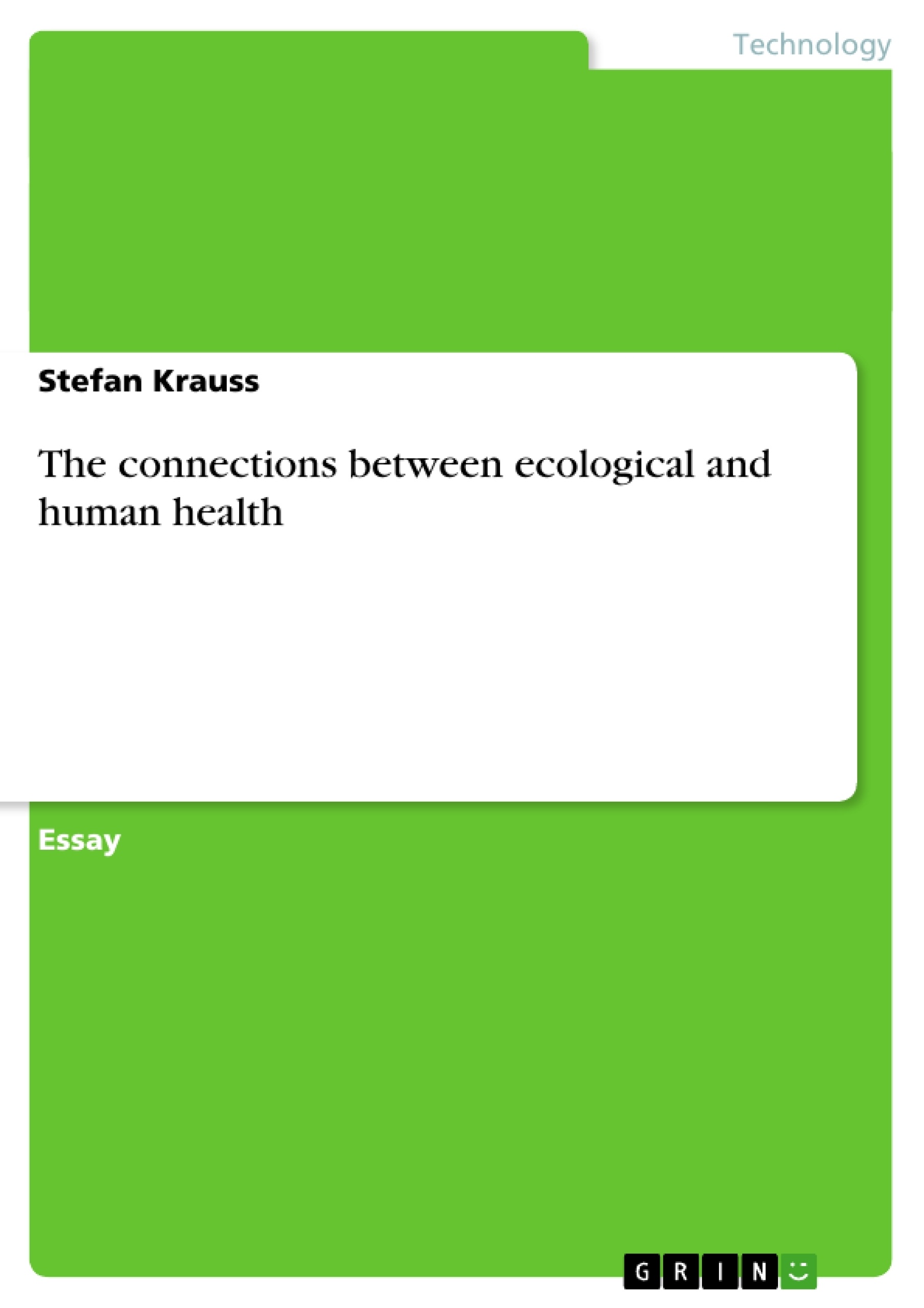From 'what' to 'how' questions: Questions of the type 'What is/are the nature/the co nnections of/between such and such?' contain archaic neglected residues. They insinuate that one heads out 'in the world' and will find 'the nature of or the connections between such and such'. The author emphasises the need to overcome such a naïve realisticontological worldview and to take a more linguistic-constructivist approach. One does not discover god-given essences or connections, but rather humans construct worldviews according to their available technologies, cultures, and aims. Thus, this essay will try to answer the question 'How do certain authors write about the connections between human health and ecological health?'. (ii) Semantic illusions: Taking Nelson Goodman seriously, the question can be divided into several sub-questions. The definite article in the notion 'the connections' seduces one to assume that there is a definite set of connections. Rather, it is the case that by different a uthors different connections are named. And actually, what does the term 'connection' mean? Linguistic connections between the terms 'human health' and 'ecological health' could be that both terms (a) contain the word 'health', (b) consist of two words, or (c) that they differ in the amount of letters. In order to try to give more 'substantial' connections between human health and ecological health, it is necessary to investigate what these terms mean, or to put it in a more appropriate way, how the (academic) community uses, applies, or employs these terms. [...]
Inhaltsverzeichnis (Table of Contents)
- Ontological rejections and semantic illusions
- Human Health
- Ecological Health
- HUMAN HEALTH IN CONTEXT
- Taking an ecological perspective
- The delusion of perfect health and its connections to ecosystems
- Globality and socio-economic connections to human health
- SUMMARIZING CLOSING WORDS AND OUTLOOK
Zielsetzung und Themenschwerpunkte (Objectives and Key Themes)
This essay explores the complex relationship between human health and ecological health, challenging traditional, reductionist approaches to understanding this connection. It moves beyond simple definitions, arguing that both terms are subject to various interpretations and constructions. By examining how different authors have written about this topic, the essay aims to identify the diverse perspectives and frameworks that shape our understanding of human health within an ecological context.
- The need to move beyond a simplistic, realistic-ontological worldview towards a more linguistically-constructivist approach to understanding human health and ecological health.
- The challenges of defining and measuring "health," particularly in relation to individual and population health.
- The interconnectedness of human health and ecological health, highlighting the co-evolutionary relationship between humans and their environments.
- The implications of environmental degradation for human well-being and the need for a global perspective on these issues.
- The role of socio-economic factors in shaping human health outcomes and the complex interplay between wealth, health, and environmental sustainability.
Zusammenfassung der Kapitel (Chapter Summaries)
- Ontological rejections and semantic illusions: This chapter introduces the essay's central argument: that traditional approaches to understanding human health and ecological health are limited and need to be reconsidered. It highlights the importance of adopting a linguistically-constructivist perspective, emphasizing the constructed nature of knowledge and the need to explore diverse interpretations of these concepts.
- Human Health: The chapter defines human health, distinguishing between individual health and population health. It discusses various indicators of health and explores the multifaceted nature of "well-being."
- Ecological Health: This chapter addresses the difficulty in defining "ecological health," highlighting the inconsistencies in terminology and the need for more robust and multi-layered definitions. It emphasizes the importance of examining the language systems used to describe ecological health and the need for clear indicators.
- Human health in context: This chapter argues that human health is deeply intertwined with the environment, encompassing natural, built, and social contexts. It introduces the concept of an ecological perspective, stressing the interconnectedness of all living things and the need to move beyond a reductionist, dualistic worldview.
- Taking an ecological perspective: This chapter explores the shift towards an ecological worldview, emphasizing the interconnectedness of human health and the environment. It discusses the limitations of a purely scientific approach and the need for a holistic understanding of complex systems and feedback mechanisms.
- The delusion of perfect health and its connections to ecosystems: This chapter challenges the notion of "perfect health," arguing that it is unrealistic and overlooks the inherent connection between human health and ecological systems. It emphasizes the importance of adaptability and the natural occurrence of disease and infirmity within the evolutionary process.
- Globality and socio-economic connections to human health: This chapter explores the global implications of environmental degradation for human health, highlighting the urgent need for a collective response to address these challenges. It discusses the role of socio-economic factors in shaping health outcomes and the impact of unsustainable lifestyles and resource depletion.
Schlüsselwörter (Keywords)
Key terms and concepts explored in this essay include human health, ecological health, ecological perspective, interconnectedness, co-evolution, environmental degradation, global health, socio-economic factors, demographic transition, sustainable development, and holistic understanding.
Frequently Asked Questions
What is the connection between human and ecological health?
The essay argues that human health is deeply intertwined with the environment, natural systems, and socio-economic contexts, forming a co-evolutionary relationship.
What is the "linguistic-constructivist" approach mentioned?
It is an approach that suggests worldviews and "connections" are not god-given essences but are constructed by humans through language, culture, and technology.
Why is the concept of "perfect health" considered a delusion?
The author argues that perfect health is unrealistic because disease and infirmity are natural parts of the evolutionary process and environmental adaptation.
How do socio-economic factors impact health?
Socio-economic factors shape health outcomes through wealth distribution, unsustainable lifestyles, and the resulting environmental degradation.
What are the challenges in defining "ecological health"?
Challenges include inconsistent terminology, the need for robust indicators, and the complexity of multi-layered environmental systems.
- Quote paper
- Stefan Krauss (Author), 2004, The connections between ecological and human health, Munich, GRIN Verlag, https://www.grin.com/document/33624



